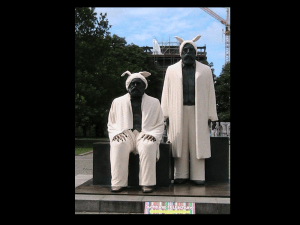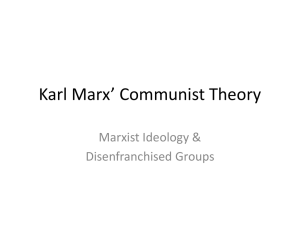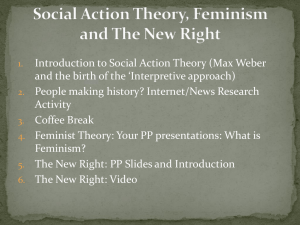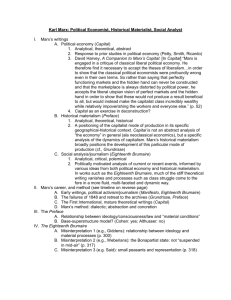More 1.) On p. 194 declares that when he looks about at the
advertisement
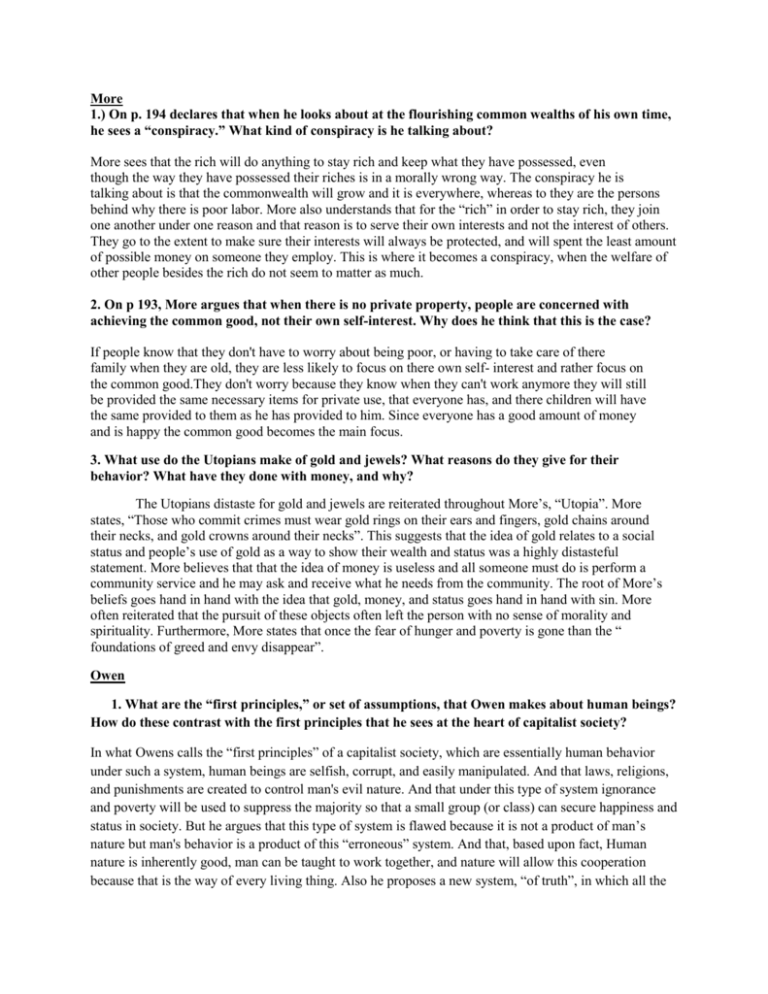
More 1.) On p. 194 declares that when he looks about at the flourishing common wealths of his own time, he sees a “conspiracy.” What kind of conspiracy is he talking about? More sees that the rich will do anything to stay rich and keep what they have possessed, even though the way they have possessed their riches is in a morally wrong way. The conspiracy he is talking about is that the commonwealth will grow and it is everywhere, whereas to they are the persons behind why there is poor labor. More also understands that for the “rich” in order to stay rich, they join one another under one reason and that reason is to serve their own interests and not the interest of others. They go to the extent to make sure their interests will always be protected, and will spent the least amount of possible money on someone they employ. This is where it becomes a conspiracy, when the welfare of other people besides the rich do not seem to matter as much. 2. On p 193, More argues that when there is no private property, people are concerned with achieving the common good, not their own self-interest. Why does he think that this is the case? If people know that they don't have to worry about being poor, or having to take care of there family when they are old, they are less likely to focus on there own self- interest and rather focus on the common good.They don't worry because they know when they can't work anymore they will still be provided the same necessary items for private use, that everyone has, and there children will have the same provided to them as he has provided to him. Since everyone has a good amount of money and is happy the common good becomes the main focus. 3. What use do the Utopians make of gold and jewels? What reasons do they give for their behavior? What have they done with money, and why? The Utopians distaste for gold and jewels are reiterated throughout More’s, “Utopia”. More states, “Those who commit crimes must wear gold rings on their ears and fingers, gold chains around their necks, and gold crowns around their necks”. This suggests that the idea of gold relates to a social status and people’s use of gold as a way to show their wealth and status was a highly distasteful statement. More believes that that the idea of money is useless and all someone must do is perform a community service and he may ask and receive what he needs from the community. The root of More’s beliefs goes hand in hand with the idea that gold, money, and status goes hand in hand with sin. More often reiterated that the pursuit of these objects often left the person with no sense of morality and spirituality. Furthermore, More states that once the fear of hunger and poverty is gone than the “ foundations of greed and envy disappear”. Owen 1. What are the “first principles,” or set of assumptions, that Owen makes about human beings? How do these contrast with the first principles that he sees at the heart of capitalist society? In what Owens calls the “first principles” of a capitalist society, which are essentially human behavior under such a system, human beings are selfish, corrupt, and easily manipulated. And that laws, religions, and punishments are created to control man's evil nature. And that under this type of system ignorance and poverty will be used to suppress the majority so that a small group (or class) can secure happiness and status in society. But he argues that this type of system is flawed because it is not a product of man’s nature but man's behavior is a product of this “erroneous” system. And that, based upon fact, Human nature is inherently good, man can be taught to work together, and nature will allow this cooperation because that is the way of every living thing. Also he proposes a new system, “of truth”, in which all the suffering from the old one will be gone. Ignorance will be replaced with education and poverty with surplus. 2. Owen argues that the principles of cooperative socialism can and should be introduced gradually into the capitalist world. Why? Owen believes that capitalism promotes selfishness and greed so therefore it is the root of many if not all problems in society. Cooperative socialism takes the greed and self interest out of society and thus would create a better world. The reason that it must be introduced gradually according to Owen is because anything introduced too quickly can cause more harm than good. If the people still believe that capitalism is a good thing they will not willingly become socialist, first they need to be convinced it is a good idea, while pacifying those who are in control of the capitalist society then a conviction to the ideals needs to be established. 3. Owen believes that his arguments about human nature and character are universally applicable. Why, then, does he think that so many people disagree with him about those principles? What does he predict the future will look like if his assumptions about human nature are wrong? While Robert Owen believes his arguments about human nature and character are universally applicable, many people disagree with Owen on the basis of a system of counteraction, and that individual interests are enough to overwhelm the interests of the collective. As Owen predicts, if his assumptions about human nature are wrong, a gradual change will eventually take place; ignorance removed; kindness becomes the universal will; interest of individuals become the interest of every individual in the world. Ultimately, the general counteraction which drives man against one another no longer exists, and happiness can be attained. Marx and Engels 1.On p. 208, Marx declares that the “theory of the Communists may be summed up in the single sentence: Abolition of private property.” In the following two pages, however, he explains precisely what he does---and does not---mean by that term. What does Marx mean by “private property”? Why does he think that in his own time “private property is already done away with for nine-tenth of the population” (p. 209)? Marx believes that private property is when an individual earns and works for his property. As he stated, the property is “hard-won, self-acquired, and self-earned. This is type of property shouldn’t be abolished since it is the individual who is benefiting from their property. It is not passed down from generation to generation. 2. Perhaps one of the most frequent criticisms of Marx is that communism would never work because without competition and the profit motive, everyone would become lazy. On p. 209, Marx explicitly addresses this criticism, and why he thinks it is wrong. What does he say? Is his assertion plausible? Why or why not? Marx addresses this criticism by saying that this is merely another expression of the tautology that “there can no longer be any wage labour when there is no longer any capital.” He goes on to say that if this were true, the bourgeois society would have suffered the same fate long ago “for those who work, acquire nothing, and those who acquire anything don’t work.” His assertion is plausible in that those who work basically acquire nothing therefore they would either lose the drive to keep working or band together and demand more for their work. 3. On pp 209-210, Marx develops his own definition of “ideology” and uses it to criticize the enemies of communism. What does he mean by this term? How is “ideology” in Marx’s sense related to the ruling class? Marx’s definition of ideology is the idea that ideology is an economic base and superstructure concerning religion, political, and legal systems. He uses it to relate to the ruling class by saying the ruling class uses it to define the means of economic production and that the ruling class uses it to force their ideology of economic on the external class. He states the ruling class uses ideology for forcing their economic interest on the working by the use of false conceptions into the working class thinking it is their best interest. Marx 1.What does Marx mean by "private property"? Why does he think that in his own time "private property is already He refers "private property," as the means of production. (for ex. a factory.) Own by capitalists, and resulting in a reason why he thought that it had already finish the nine-tenths of the population in his time because he believed the few is solely due to it's non-existence of any property for the immense majority of society. The Bourgeosie deprive basically in his eyes only efficient way to run society is by communism. 2. Marx claims, “it is the consciousness of men that determines their being, but, on the contrary, their social being that determines their consciousness.” Simplified somewhat, Marx is describing a relationship between the ideas human beings hold in their heads, and the things they do in the world. What, according to Marx, is that relationship? Is his view valid or plausible one? Why or why not? Marx believes that the relationship is one between men, in which they look at things according to the fascination they have in their consciousness. To understand what these fascinations are we must first know and understand the religious world. Within this conscious realm the human mind begins its own interpretation of life; thus causing these fascination to intertwine with day-to-day life. I would offer that Marx’s view is very much valid; we as a people tend to want things that we know we can’t have. Human sit and they fantasize about how they want things to be. Not knowing that many times it’s a conflict with what happens within their daily lives. 3. Marx contends that “ No social order ever perishes before all the productive forces for which there is room in it have developed; and new, higher relations of production never appear before the material conditions of their existence have matured in the womb of the old society itself. “ Given Marx’s theory of history, what does this mean? Might this give current-day Marxists some hope for a revival or the Marxian revolutionary project? Why or why not? The quote suggests that a society is dependent on the production industry. If no one is producing material items in factories, mines, ect., then the society would crumble because Marx’s whole idea is focused on the importance of the production force This gives hope to current-day Marxists because countries like the US depend on other countries for production of their material and as a result there are fewer jobs for the citizens of their own country which causes said citizens to become angry, frustrated, and turn against their society.


